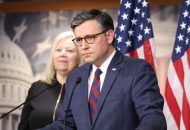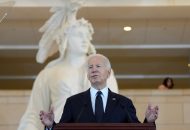Supreme Court Strikes Down Maine Policy Barring Tuition Aid for Religious Schools

WASHINGTON — The Supreme Court on Tuesday struck down a longstanding education policy in Maine that made K-12 schools with religious instruction ineligible for taxpayer-backed tuition aid.
Writing for the majority in the 6-3 decision, Chief Justice John Roberts held the state’s so-called “nonsectarian” requirement for otherwise generally available tuition assistance payments violated the free exercise clause.
At issue in the underlying case was a decades-old program that provided tuition assistance for parents who live in school districts that neither operate a secondary school on their own nor contract with a particular school in another district.
Under the program, parents designate the secondary school they would like their child to attend, and the school district transmits payments to that school to help defray the costs of tuition.
Participating private schools must meet certain requirements to be eligible to receive tuition payments, including either accreditation from the New England Association of Schools and Colleges or approval from the Maine Department of Education.
Since 1981, however, Maine has imposed a requirement that any school receiving tuition assistance payments must be “a nonsectarian school in accordance with the First Amendment of the United States Constitution.”
The petitioners in the case, David and Amy Carson of Glenburn, Maine, and Troy and Angela Nelson of Palermo, Maine, sought tuition assistance to send their children to sectarian schools.
In the Carsons’ case, they wanted to send their daughter to the Bangor Christian School; in the Nelsons’ case, it was the Temple Academy, a “sectarian” school affiliated with Centerpoint Community Church.
Both families cited the high academic standards of the schools and the fact the schools’ “worldviews” aligned with their “sincerely held religious beliefs.”
After they were told they were ineligible for tuition assistance, both families sued the Maine Department of Education, alleging that the “nonsectarian” requirement violated the Free Exercise Clause and the Establishment Clause of the First Amendment, as well as the
Equal Protection Clause of the 14th Amendment.
A federal judge rejected the families’ constitutional claims and granted judgment to the commissioner, a ruling that was later affirmed by the 1st U.S. Circuit Court of Appeals.
To explain the majority’s position, Roberts relies on principles outlined in two recent cases, Trinity Lutheran v. Comer and Espinoza v. Montana Department of Revenue.
“Maine offers its citizens a benefit: tuition assistance payments for any family whose school district does not provide a public secondary school. Just like the wide range of nonprofit organizations eligible to receive playground resurfacing grants in Trinity Lutheran, a wide range of private schools are eligible to receive Maine tuition assistance payments here,” Roberts wrote.
“And like the daycare center in Trinity Lutheran, BCS and Temple Academy are disqualified from this generally available benefit ‘solely because of their religious character’ … By “condition[ing] the availability of benefits’ in that manner, Maine’s tuition assistance program – like the program in Trinity Lutheran – ‘effectively penalizes the free exercise’ of religion,” the chief justice continued.
“Our recent decision in Espinoza applied these basic principles in the context of religious education that we consider today. There, as here, we considered a state benefit program under which public funds flowed to support tuition payments at private schools. And there, as here, that program specifically carved out private religious schools from those eligible to receive such funds.
“While the wording of the Montana and Maine provisions is different, their effect is the same: to ‘disqualify some private schools’ from funding ‘solely because they are religious,’” Roberts wrote, adding, “A law that operates in that manner, we held in Espinoza, must be subjected to ‘the strictest scrutiny’ … To satisfy strict scrutiny, government action ‘must advance interests of the highest order and must be narrowly tailored in pursuit of those interests.’”
Policies that target religious conduct for distinctive treatment will survive strict scrutiny only in rare cases, Robert said. “This is not one of them.”
“Maine’s decision to continue excluding religious schools from its tuition assistance program after Zelman thus promotes stricter separation of church and state than the Federal Constitution requires,” he said.
In dissent, Justice Stephen Breyer said he believes the majority paid too little attention to the Establishment Clause in deciding the case while paying too much heed to the Free Exercise Clause.
The majority’s decision, he wrote in an opinion joined by Justice Elena Kagan and in part by Justice Sonia Sotomayor, “fails to recognize the ‘play in the joints’ between the two clauses.”
“That ‘play’ gives states some degree of legislative leeway,” Breyer wrote.
“It sometimes allows a state to further anti-establishment interests by withholding aid from religious institutions without violating the Constitution’s protections for the free exercise of religion. In my view, Maine’s nonsectarian requirement falls squarely within the scope of that constitutional leeway,” he added.
In her own dissent, Sotomayor marveled at “what a difference five years makes.”
“In 2017, I feared that the Court was ‘lead[ing] us . . . to a place where separation of church and state is a constitutional slogan, not a constitutional commitment’ … Today, the Court leads us to a place where separation of church and state becomes a constitutional violation.
“If a state cannot offer subsidies to its citizens without being required to fund religious exercise, any state that values its historic anti-establishment interests more than this Court does will have to curtail the support it offers to its citizens. With growing concern for where this Court will lead us next, I respectfully dissent,” she concluded.
Dan can be reached at [email protected] and at https://twitter.com/DanMcCue.
























